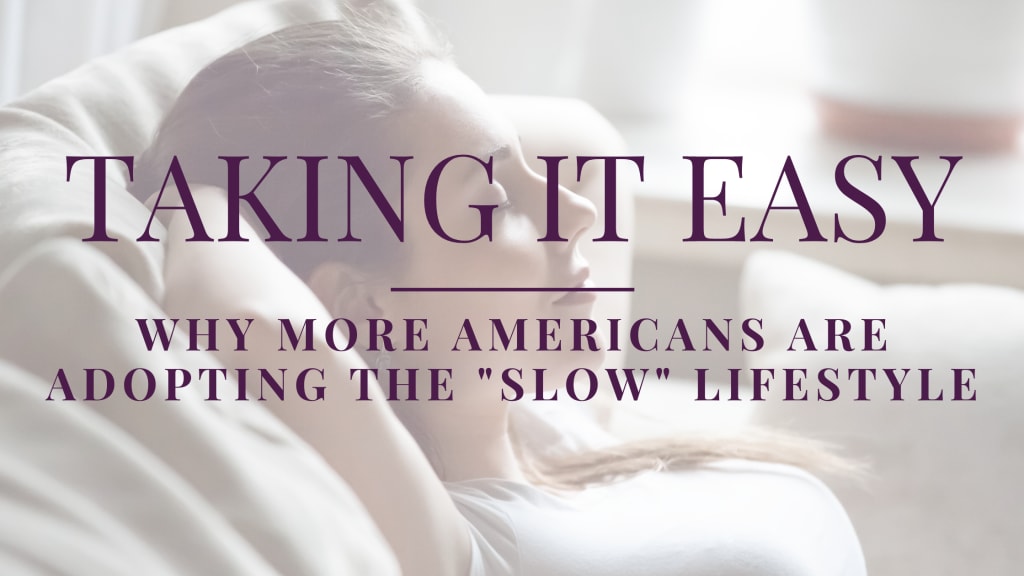Taking it Easy
Why More Americans are Adopting The "Slow" Lifestyle

In response to the fast-paced, high-stress nature of modern life, which has left many feeling overwhelmed and disconnected, a growing number of Americans have begun to embrace the "slow" lifestyle. The hashtag #slowlife has nearly 5.5 million posts on Instagram and 555 million views on TikTok. A slow life is considered one that's mindful, meaningful, and free of unfulfilling busyness. Individuals following this trend are intentional with their time and resources. Notably, slow-life advocates are also mindful of the time they spend on tech devices, especially the time spent on social media.
However, the slow lifestyle doesn't look the same for every person. Some may simply prioritize family over work, while others may build a life around homesteading.
Two of the main reasons this trend is growing are the rise in burnout rates and the rise of toxic productivity. Individuals have gradually become more pressured by society's push to always be productive and never have downtime. This concept has become known as toxic productivity. Toxic productivity and burnout go hand in hand. The American Psychological Association reports that 80% of employees experience work-related stress at least once a month, and 3 in 5 employees experience negative impacts from work-related stress — 44% report physical fatigue, and 36% report cognitive weariness. The slow lifestyle contrasts this- instead of constantly finding some way to fill their time, those who follow the principles of slow living stay in the present and rest their bodies and minds (without feeling guilty) whenever necessary. Some of the principles of slow living come from the Japanese concept of ikigai – which means 'a reason for being'. The concept gives a person a sense of purpose and a reason to live rather than overwhelming oneself with overarching targets and ambitions.
If we dig deeper, we realize that one of the primary drivers behind adopting a slow lifestyle is the desire for a better work-life balance. Many Americans have found themselves trapped in a cycle of long working hours, constant connectivity, and high stress. This relentless pace often leads to burnout and a diminished quality of life. By slowing down, individuals can create more space for relaxation, family, and personal interests, leading to a more fulfilling and balanced life.
The slow lifestyle is also closely linked to the rise of mindfulness practices and the growing focus on mental health and well-being. Mindfulness encourages individuals to be present in the moment, fostering a deeper appreciation for life's simple pleasures. Practices such as meditation, yoga, and mindful eating are integral to slow movement, helping people reduce stress, improve mental clarity, and enhance overall well-being. This holistic approach to health appeals to those seeking to escape the chaos of daily life.
Environmental concerns are also a significant factor driving the slow lifestyle movement. As awareness of climate change and environmental degradation grows, more Americans are looking for ways to reduce their ecological footprint. The slow lifestyle promotes sustainable living practices, such as consuming locally sourced and organic foods, reducing waste, and supporting eco-friendly businesses. By adopting these practices, individuals can contribute to the preservation of the planet while enjoying a more conscious and intentional way of living.
The slow lifestyle also promotes a sense of community and connection. In an age of digital communication and social media, many people feel isolated and disconnected from those around them. The slow life approach encourages face-to-face interactions over simply Facetimeing your friends and family and advocates community involvement. These practices help to build stronger, more resilient communities where people feel connected, heard, and supported.
Thus, at its core, the slow lifestyle is about rediscovering the joy in simple, everyday pleasures. Whether it's savoring a home-cooked meal, taking a leisurely walk in nature, or spending quality time with loved ones, the slow movement encourages individuals to find happiness in the present moment. This shift in focus from constant productivity to mindful enjoyment can lead to a more satisfying and enriched life.
About the Creator
Rebeccah Sanders
Rebeccah Sanders is a born leader with over two decades of experience. Her goal is to improve equity and inclusion wherever she goes. Visit RebeccahSanders.org.
Enjoyed the story? Support the Creator.
Subscribe for free to receive all their stories in your feed. You could also pledge your support or give them a one-off tip, letting them know you appreciate their work.






Comments
There are no comments for this story
Be the first to respond and start the conversation.